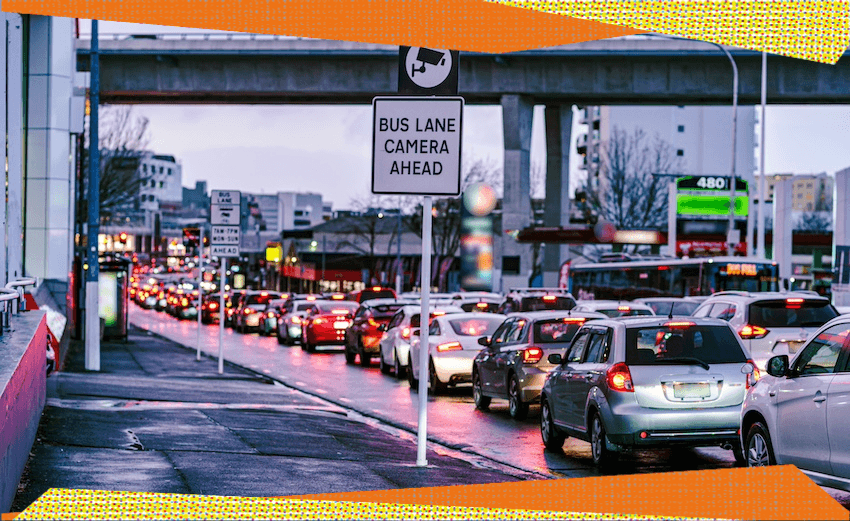Manurewa Local Board chair Glenn Murphy says there should be leniency for first-time offenders, such as the constituent he’s helping who is in no position to pay the steep $150 fine, he tells Stewart Sowman-Lund.
An Auckland Council local board chair has criticised council-controlled organisation Auckland Transport for what he calls “heavy-handed” and “grossly unfair” fines, and is hoping the new government will step in.
Anyone caught driving in a bus lane for more than its final 50 metres can be pinged $150. As detailed by The Spinoff earlier in the year, that’s well above the standard fine for other offences, such as overstaying in a regular car park (as little as $12) or even parking in a bus lane ($60). At the top end of the spectrum, an overdue registration or warrant of fitness brings with it a $200 fine.
Some bus and special vehicle lanes have pulled in millions of dollars in fines. Figures released to The Spinoff showed that from July 2021 to April this year, of Auckland’s 10 highest-earning bus lanes, eight had brought in more than $1.5 million each. A single lane in Auckland’s Newmarket made close to $8m from 53,000 infringements over that time period.
Meanwhile, a lane on Queen Street situated next to ongoing roadworks has also proved profitable. At one point, it was making about $18,000 every single day of operation.
Glenn Murphy, who is the chairperson of the Manurewa Local Board, told The Spinoff he’d been approached by a constituent who had received a $150 fine for making a turn into a bus lane in Puhinui, near Papatoetoe.
“A hundred and fifty dollars for driving 51 metres in an empty bus lane seems like an exorbitant amount,” Murphy told The Spinoff. “It’s cheaper to exceed the speed limit by 10 kilometres per hour than to drive at the correct speed one metre too far in a special lane.”
In the case of his constituent, Murphy said they had simply made a “mistake” as they were driving in an unfamiliar part of Auckland. “You don’t manage to take in all the various signs, you’re just following Google Maps saying ‘turn left’,” he said.
“I did write to [Auckland Transport] and say the circumstances [of the constituent]. They said ‘nah, we’ve reviewed it’.”
Murphy said it was all well and good for someone from AT “earning $100k a year or whatever they’re raking in” to suggest the fine was appropriate. But in this particular case, his constituent just wasn’t in a position to pay $150. “It seems a little bit heartless on their first offence to not say ‘it’s a warning this time’.”
In a follow-up email sent to Auckland Transport, and seen by The Spinoff, Murphy decried the “very unfortunate dealings” his constituent had had “with the stone-cold AT mega-corporation’s compliance department” and provided more specific dealings about their situation. At the time of writing, Murphy had not received a response.
Previously, Auckland Transport has said that fines accrued from bus lanes weren’t about making money. “Our primary consideration is the effectiveness of our transport system – revenue is not our focus,” a spokesperson told RNZ last year.
AT’s group manager of parking services, John Strawbridge, expanded on this in comments to The Spinoff in May. “Our compliance activities are focused on ensuring our transport system can operate efficiently and that our city’s transport and parking assets are being used fairly and equitably,” he said.
Murphy didn’t buy that and said he believed the system was “grossly unfair” for drivers. “I think they should be able to give some leniency. If you’re a repeat offender after you’ve been given a warning, I think it’s fairer to say ‘right, I’ll ping you $50, you do it again, $100’, and then it will rank it up to $150 if you’re ignoring the rules.
“Most of these people are just going somewhere for the first time – and they get these horrid letters saying ‘150 bucks thanks’.”
Asked for comment, Auckland Transport’s head of parking compliance Rick Bidgood told The Spinoff that requests for fine reviews were looked at on a “case-by-case” basis. Evidence of the offence would be taken into account along with “the member of the public’s rationale for enabling the offence to take place”, he said.
Infringement fees were set at a national level and once an offence had been issued it became a legal document. “Adjudication holds the legal delegation to review and, in some cases, exempt,” said Bidgood. “In some cases, with multiple offences, AT may enter into an agreement with the member of the public on how many are paid and if exempting any is suitable in this case.”
Murphy found it hard to understand why Auckland Transport didn’t have control over setting infringement costs. He had approached Simeon Brown, the likely next minister of transport, and hoped his “commonsense” approach would see him adjust the rules once in government. “He’s a Manurewa boy, he knows the hardship of a number of people here,” said Murphy.
Brown did not respond to The Spinoff’s request for comment. A National Party spokesperson said: “National first has to form a government and appoint ministers.”
An earlier review of parking penalties, which included fines for driving in bus lanes, had been initiated by the outgoing government but was, ironically, stalled earlier in the year due to the cost of living crisis.





